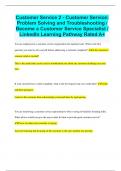Exam (elaborations)
MBA 705 - Minsun Kim Exam 3 Questions with 100% Actual correct answers | verified | latest update | Graded A+ | Already Passed | Complete Solution
MBA 705 - Minsun Kim Exam 3 Questions with 100% Actual correct answers | verified | latest update | Graded A+ | Already Passed | Complete Solution
[Show more]












